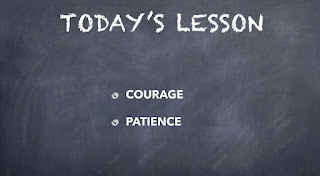COURAGE
"Courage is not the absence of fear, but the judgement that something else is more important than fear "– this is the thought that we mentors should encourage and engrave in the minds of our students.
The emotion 'fear' is something that a child is born with; that is why an infant startles at a loud sound, the fear of the unknown makes that baby cry. It is the value of 'Courage' that parents and we teachers need to teach the child the way to overcome 'Fear'.
As a teacher, I have noticed children having fears of different kinds. Some are scared of their exams, some are scared to express themselves to their teachers in class, and some are even scared to talk to their peers. All these children are aware of their fears, and they avoid them as much as possible. I believe all fears have a history of some occurrence in a child's life.
Various actions in a child's life leave a conscious, sub-conscious effect on the child's mind and affect the child's behaviour in the future. There are fears which set in the child due to lack of self-confidence. Children are conditioned through their environment to judge their own life and categorize the same into failures and success. Hence, the fear of failure discourages the child from even attempting.
The students should be discouraged from judging every action of theirs and be taught to concentrate on analyzing their abilities and be conscious of their limitations. We teachers should make a child understand to hone their skills and encourage them to do the little bit 'extra' in a particular field, only if the child is capable of the same. It can never be forgotten that children always learn by observation. Hence, teachers and parents must circumvent all their activities into failures and successes.
Teachers should counsel the parents of the children to understand their children as separate human beings and not as their reflection and expect the child to fulfil specific aspirations they were unable to achieve. A parent must realize that their child has his own likes, dislikes, and aspirations as a separate individual. Parents are responsible for encouraging their children to follow their dreams and become happy, confident humans.
As a teacher, it is practically impossible to control the environment children face at home. Hence it becomes essential that they have to create a competitive yet hypercritical free environment at school.
A few pointers that can help us cultivate courage are -
- Understanding the background of the child and the reason for his/her such behaviour.
- We must observe them minutely so that we can bring positive change in the behaviour of the child.
- Share real-life stories with them that will bring courage to their life.
- Nudge them to get involved in a cause for which they are passionate.
- Encourage them to volunteer in class activities.
- Create a nurturing environment for your students.
- Encourage students to achieve their goals.
Teaching students to have courage in the classroom not only increases engagement and academic achievements but also helps them to face adversities in life. To develop courage in a child, as a teacher, we need to gain that child's confidence and make them realize that having fear is normal. We teachers can share our personal anecdotes with the child, our own stories wherein we have overcome our fears and those situations of how we have learnt to handle our concerns. A teacher expressing their personal experience gives the child a sense of confidence to relate with their teacher and accept themselves as they are.
It is important to make the child realise that being brave is not to be scared ever but to overcome the fear and to not allow it to control our actions.
Teachers should be evaluative, not judgmental; we should not judge a child by their fear and give up on their activities. On the contrary, when we evaluate the child, we should remember their drawbacks and judge them on their own standards. If a child learns to compete with himself and strive to outdo his previous performance, he surely will be calmer and ready to face the competitive world in the right frame of mind.
PATIENCE
Patience is truly a virtue that is very important that it is imbibed in every person. Due to curiosity and anxiousness, children get confused about how to handle the situations and are generally in a hurry to complete the work at hand and hence do not develop the virtue of patience. Technology and modern gadgets have made life move at a faster pace, the younger generation is used to seeing life at this pace, and they are unaware of life at a calmer and slower pace.
To teach the children the virtue of patience is a huge task. We can cultivate patience in children by creating in them the realization of the advantages of being patient. We can teach patience with very regular day-to-day examples like showing them to wait for a flower to bloom and making them realize that the result is always excellent by waiting patiently.
How a teacher can encourage a pupil to be patient are:
- By giving them tasks that show results after a long period
- Evaluating the mistakes they make, being in a hurry and giving them feedback on their performance would have been better if they did it with patience.
- Encourage activities like participating in book reading clubs.
- A few activities for children to teach them patience
- Pass the Parcel. Wrap a present in many layers and hand it over to the kids
- Baking
- Gardening
- Work on a Puzzle.
Maitreyi and Sukhpreet
Gyanshree School Noida


No comments:
Post a Comment